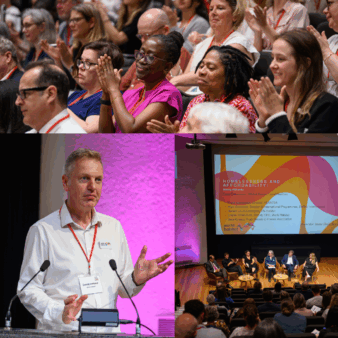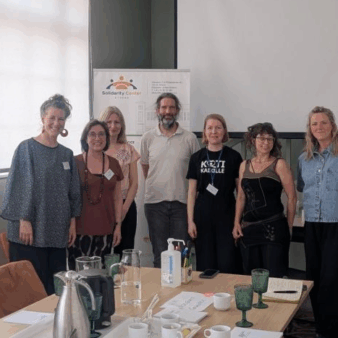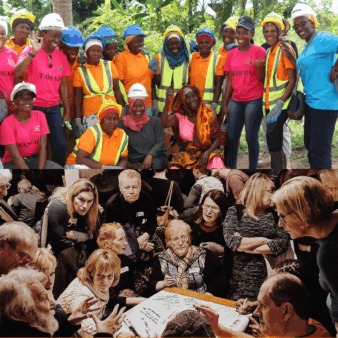
Every year the World Habitat Awards show us new and unique solutions that address some of the world’s most complex housing challenges. In 2013 and 2014 the 100,000 Homes Campaign in the USA, and the Y-Foundation in Finland, won World Habitat Awards for their approaches to tackling homelessness. Inspired by these, in 2015 World Habitat initiated a European homelessness programme which brought together the key elements from both of these winners.
Today, we’ve published an Impact Report, which outlines the successes and challenges of co-ordinating a network of individual campaigns to end street homelessness across several European cities.
As the overall campaign’s Impact Manager, it’s vital that World Habitat demonstrates how we’ve used our independence and expertise to challenge the status quo by delivering this bold project. Establishing a campaign for change around street homelessness has been a big, but welcome shift for us. This report tells the story of the campaign, explains our model, why we’re investing so much in it and what we’re trying to achieve together. Most importantly it shares the incredible work being delivered by our campaign cities.
But what have we learnt?
First of all, while street homelessness hasn’t ended, we’ve made a start. This campaign was specifically set up to support community-led campaigns in cities across Europe with the necessary backing to really start ending street homelessness, rather than just managing it.
Street homelessness continues to grow in most European cities. However, this campaign’s model is inspired by those areas that’ve been successful in significantly reducing or ending street homelessness. This meant, before anything else, we needed to properly understand who is ‘rough sleeping’ in a local area. This included taking the time to involve local residents and ensure that people experiencing homelessness can fully share their stories, know they are being taken seriously, and can say what they need and want. This was and is still key to developing local plans.
Over the past three years we’ve trained and supported almost 3,000 community volunteers to engage with people experiencing homelessness. Such actions often lay the groundwork to start making the challenging but essential steps towards providing unconditional housing solutions that provide the right level of support. By the end of 2018, our campaign had moved 344 people into permanent accommodation, and created 163 independent Housing First units.
Secondly, we’ve learnt how embedding new practices requires both time and leadership but, above all else, a willingness from key stakeholders to act together. Without this, delivering meaningful change is almost impossible.
In Bratislava, we see the real challenges that services face because there’s no formal definition of homelessness in Slovakian law.
In Alicante and Valencia there’s great enthusiasm in mobilising their communities to deliver initial Connections Weeks. However, as services switch their focus to developing necessary national strategies, sustaining local participation can be a challenge.
In Barcelona, the campaign’s effective ways of working have had a profound impact on how homelessness is now measured and responded to by the local municipality.
In Torbay, in South West England, change is happening. They’ve developed their first ever Housing First project and traditional commissioning structures have been realigned into a formal alliance partnership, in which risk and responsibility are shared between the local authority and homelessness organisations across the area.
This Campaign started as an adaptation of a community-led homelessness initiative from the USA, and a national model from Finland. All cities who joined our campaign understood that their involvement was part of testing out this model – and in little more than three years we have built up a body of practical resources. We’ve put many of these together into a campaign toolkit. This is available for everyone, whether you’re a campaign city or not, to help you in your own work.
At the beginning some elements felt quite ‘Americanised’ as we had rightly borrowed learning and resources from our World Habitat Award winners. Several years on, we are now in a position to talk with confidence about a European model of campaigning using the knowledge gained from cities such as Brussels, Barcelona, Glasgow and Leicester. The different cultural, political, funding and human experiences between many of our cities has provided the campaign with a unique, cross-cultural richness that’s rare in the homelessness sector. This Impact Report summarises just some of their key areas of work, demonstrating how each campaign city is tackling street homelessness in their area.
It’s been a good start – but evidence from across Europe shows that there still remains so much more to be achieved. And, of course, we wish we could have made more progress, quicker. But now our focus is firmly on how we build on the initial success over the next few years as we help our cities develop and grow their individual campaigns and impact. Nothing is static in the complex world of homelessness and we need to continue to learn and adapt.
Please take the time to read and share this report, and if you want to follow the progress of this campaign you can sign up to our Campaign e-bulletin. What this campaign proves is that when people and organisations work well together, we get closer to that day when we have ended street homelessness for good.
DOWNLOAD THE FULL IMPACT REPORT HERE
Image: Arrels Fundació




Join the discussion